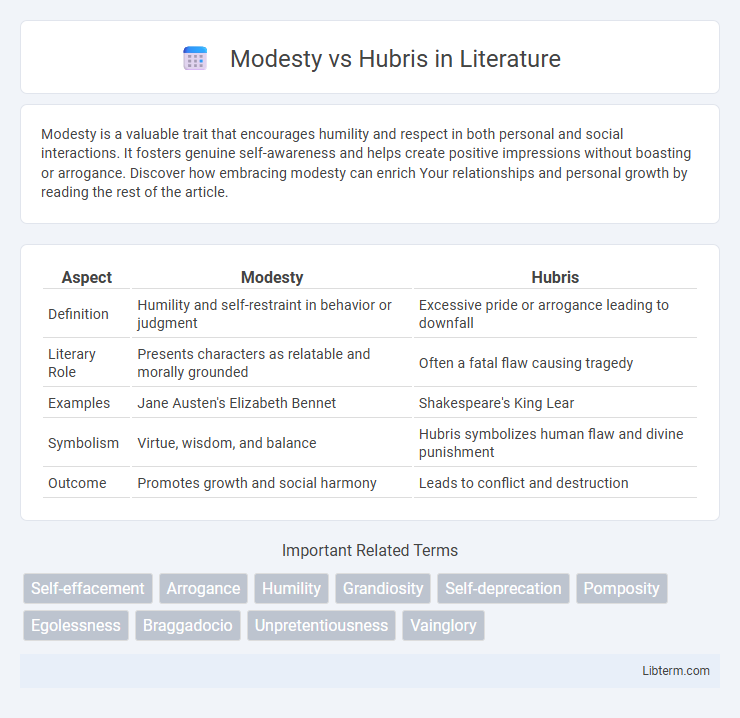Modesty is a valuable trait that encourages humility and respect in both personal and social interactions. It fosters genuine self-awareness and helps create positive impressions without boasting or arrogance. Discover how embracing modesty can enrich Your relationships and personal growth by reading the rest of the article.
Table of Comparison
| Aspect | Modesty | Hubris |
|---|---|---|
| Definition | Humility and self-restraint in behavior or judgment | Excessive pride or arrogance leading to downfall |
| Literary Role | Presents characters as relatable and morally grounded | Often a fatal flaw causing tragedy |
| Examples | Jane Austen's Elizabeth Bennet | Shakespeare's King Lear |
| Symbolism | Virtue, wisdom, and balance | Hubris symbolizes human flaw and divine punishment |
| Outcome | Promotes growth and social harmony | Leads to conflict and destruction |
Understanding Modesty and Hubris
Understanding modesty involves recognizing one's limitations and valuing humility, which fosters personal growth and positive social interactions. Hubris, characterized by excessive pride and arrogance, often leads to overestimation of abilities and potential downfall. Balancing modesty and hubris is crucial for developing self-awareness and maintaining healthy relationships.
The Origins of Modesty and Hubris
Modesty and hubris trace their origins to ancient Greek philosophy and literature, where modesty was linked to balance and humility, reflecting social harmony and virtue, while hubris denoted excessive pride leading to ruin and divine punishment. The concept of hubris originates from Greek tragedy and mythology, illustrating the catastrophic consequences of overstepping human limits and disrespecting the gods. Modesty emerged as a cultural ideal emphasizing self-restraint and respect for others, serving as a counterforce to the destructive nature of hubris.
Psychological Foundations: Why We Choose Modesty or Hubris
The psychological foundation of choosing modesty or hubris often stems from individual self-perception and social feedback mechanisms. Modesty arises from an internalized balance between self-awareness and external validation, promoting humility and adaptive social behavior, while hubris is linked to inflated self-esteem and a diminished sensitivity to social norms, often triggered by past successes or power dynamics. Cognitive biases, such as the Dunning-Kruger effect, also influence whether individuals lean toward modest or hubristic behaviors by distorting their self-evaluation.
Modesty in Different Cultures
Modesty manifests uniquely across cultures, shaping social interactions and values in diverse ways. In East Asian societies, modesty emphasizes humility and collective harmony, often reflected in language and nonverbal cues that downplay personal achievements. Western cultures also value modesty but frequently balance it with expressions of individual confidence, highlighting different expectations in personal and professional settings.
Hubris: Historical Examples and Consequences
Hubris, often exemplified by excessive pride and arrogance, has led to the downfall of prominent historical figures such as Napoleon Bonaparte, whose overconfidence in military campaigns resulted in devastating defeats. The tragic fate of King Xerxes, who underestimated the resilience of the Greek city-states during the Greco-Persian Wars, highlights the perilous consequences of hubristic leadership. These examples illustrate how hubris can trigger strategic miscalculations, loss of power, and long-lasting negative impacts on empires and societies.
The Role of Modesty in Personal and Professional Success
Modesty fosters genuine self-awareness and openness to feedback, essential traits for continuous personal and professional growth. It cultivates trust and collaboration by encouraging humility and respect in relationships, enhancing leadership effectiveness. Embracing modesty can lead to sustainable success by preventing overconfidence and promoting adaptive learning.
Dangers of Hubris in Leadership and Decision-Making
Hubris in leadership often leads to overconfidence, clouding judgment and resulting in reckless decisions that jeopardize organizational stability. Leaders who exhibit excessive pride may dismiss critical feedback, causing strategic blind spots and fostering toxic workplace cultures. The dangers of hubris highlight the necessity for self-awareness and humility to ensure balanced decision-making and sustainable success.
Balancing Confidence, Modesty, and Arrogance
Balancing confidence, modesty, and arrogance requires recognizing the fine line between self-assurance and overestimating one's capabilities. Confidence entails a realistic belief in one's skills, while modesty embraces humility and openness to learning, preventing the pitfalls of hubris. Cultivating this balance enhances personal growth, fosters respect from others, and supports effective decision-making.
Recognizing Modesty and Hubris in Daily Life
Recognizing modesty in daily life involves observing genuine humility, openness to feedback, and respectful acknowledgment of others' achievements, which contrasts sharply with hubris marked by arrogance, overconfidence, and dismissiveness toward criticism. Behavioral cues such as active listening, balanced self-presentation, and collaborative attitudes signal modesty, while boastful talk, refusal to admit mistakes, and dominance in conversations often indicate hubris. Understanding these traits helps improve interpersonal relationships, workplace dynamics, and personal growth by promoting empathy and self-awareness.
Cultivating Healthy Self-Perception: Moving Beyond the Dichotomy
Cultivating healthy self-perception involves recognizing the nuanced spectrum between modesty and hubris rather than adhering to a strict dichotomy. Embracing balanced self-awareness allows individuals to appreciate their strengths without falling into arrogance or diminishing their worth through excessive modesty. Psychological studies emphasize that this equilibrium fosters emotional resilience, authentic confidence, and improved interpersonal relationships.
Modesty Infographic

 libterm.com
libterm.com